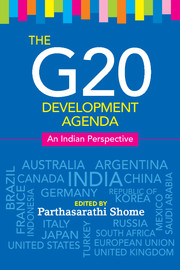Book contents
- Frontmatter
- Contents
- List of Tables and Figures
- Preface
- Section 1 Introduction
- Section 2 The Development Agenda
- Section 3 Energy Security and Environmental Sustainability
- 6 The Co-benefit Principle and the Durban Platform: Towards an Inclusive Framework for Negotiating Climate Finance
- 7 Greening the G20 Agenda: A Way Forward
- 8 Revisiting Fossil–Fuel Subsidies in the Context of Ongoing G20 Dialogue
- 9 Should India Join the International Energy Agency?
- Contributors
- Index
6 - The Co-benefit Principle and the Durban Platform: Towards an Inclusive Framework for Negotiating Climate Finance
from Section 3 - Energy Security and Environmental Sustainability
Published online by Cambridge University Press: 05 May 2015
- Frontmatter
- Contents
- List of Tables and Figures
- Preface
- Section 1 Introduction
- Section 2 The Development Agenda
- Section 3 Energy Security and Environmental Sustainability
- 6 The Co-benefit Principle and the Durban Platform: Towards an Inclusive Framework for Negotiating Climate Finance
- 7 Greening the G20 Agenda: A Way Forward
- 8 Revisiting Fossil–Fuel Subsidies in the Context of Ongoing G20 Dialogue
- 9 Should India Join the International Energy Agency?
- Contributors
- Index
Summary
Introduction
The benchmark of an efficient and just system of financing global public goods has centered on the maxim of ‘new and additional resources that are predictable, adequate and equitable’. Despite the importance accorded by the global community for financing activities that address climate change issues, nothing much has been achieved in tangible terms. The concept of ‘adequacy’ of climate financing can be judged by the supply of funds relative to needs. Alternatively it can be taken to mean flow of funds that are sufficient to cover relevant costs (Muller, 2008). However, the flow of funds for development and global environmental causes has not been encouraging even in years when the global economy was booming. In 2007, ODA flows through bilateral and multilateral channels were only of the order of $103.7 billion (UNFCCC, 2008, p. 91). This represented on an average 0.23 per cent of the GDP of developed countries as against the Monterry ODA Target of 0.7 per cent of Gross National Income (Ibid, 2008).
While funds that are available for adaptation and mitigation are inadequate, the case of ‘adaptation’ is in particular fragile, since private funds do not have a propensity to invest in adaptation projects as compared to mitigation projects. The balanced emphasis on both mitigation and adaptation in the ‘Durban Platform on Enhanced Action’ adopted by the Parties to the Convention in 2011 and the incorporation of the ‘loss and damage’ window for poor countries by the Conference of Parties to the UNFCCC at its nineteenth session in Warsaw (UNFCCC, 2013), throws up in sharper relief the ‘resource inadequacy’ problem for climate change.
Nearly 60 per cent of total global investment in environmental projects has been mobilized from domestic sources (ibid, p. 90). Annual availability of adaptation funds has been less than $500 million/year (ibid, p. 92). By comparison, funds annual available for mitigation is pegged close to $1 billion/year.
- Type
- Chapter
- Information
- The G20 Development AgendaAn Indian Perspective, pp. 161 - 182Publisher: Cambridge University PressPrint publication year: 2015
- 1
- Cited by



